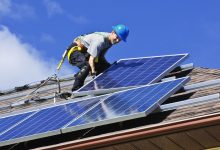The much-anticipated draft determination from the Australian Energy Market Commission that proposes rule changes to pave the way for a “solar tax” on rooftop PV exports to the grid is getting a mixed response from industry and consumer groups.
As detail from the highly complex 264-page document is sifted through, reactions filtering through to the media range from ‘no biggie,’ to ‘needs more work,’ to ‘needs to be thrown in the bin.’
“It’s the last thing we wanted to wake up to this morning,” said PV advocacy group Solar Citizens. “What’s on the table is a rule change that will allow networks to charge solar owners for sharing their clean power with the grid.
“This is a slap in the face to Australia’s 2.6 million solar homes and businesses, and it will hold back the clean energy transition. We need to be encouraging more rooftop solar, not penalising people doing the heavy lifting.”
The Tasmanian Renewable Energy Alliance described the AEMC’s draft decision as “a misguided approach” to the increased take-up of solar and other distributed energy resources, but also “not a big deal,” in that it was only a draft and nothing would change quickly, or easily.
“Punishing solar owners with extra charges is a misguided way to fund changes that need to be made to upgrade the distribution network,” said the TREA’s executive officer Jack Gilding.
“It is also discriminatory. Large power stations are not charged to use the network to export power, neither should solar owners.
“There are many positive ways of encouraging consumers to invest in new technology and change their behaviour in ways that benefit all consumers. These include time-of-use tariffs, better feed-in tariffs and virtual power plants,” Gilding added.
“Charging consumers for feeding energy into the grid sends the wrong message at a time when we need to be maximising the use of renewable energy.”
The Clean Energy Council, one of Australia’s peak renewable energy industry bodies, said the AEMC’s draft determination raised more questions than it answered, particularly around how the solar tax would be implemented and how consumer interests would be protected.
“There is still substantial detail required concerning the conditions and terms of any charges and how they would be implemented,” the CEC said on Thursday.
“It appears as though the all-important job of consumer protection has been passed to the states,” said CEC chief Kane Thornton.
“We need to know whether state and territory energy ministers will allow networks to charge customers whenever they export electricity to the grid and, if so, what customer protections will be put in place.”
The CEC said the key questions consumers should be asking was whether export charges would be applied to all existing customers or only new connections and whether distribution networks would be allowed to continue imposing zero export limits for solar and battery systems.
Bruce Mountain, director of the Victoria Energy Policy Centre at Victoria University and a longtime critic of plans to charge a solar export tax, argues here on RenewEconomy that the draft determination proposes radical changes to the arrangements for access to the electricity distribution system based on “frivolous” claims and a false premise.
“This is a very important and far reaching decision. If accepted by ministers it has the potential to greatly change the development of the electricity system in Australia,” Mountain writes.
“My impression of the early media coverage is that there is general acceptance of the AEMC’s premise of bottlenecks associated with rooftop solar; and of their consequent proposal to charge households with rooftop solar for the use to the network to ship their solar exports.
“But is it true that the distribution system is congested as a result of the increasing uptake of rooftop solar and, assuming this is the case, is it a reasonable response to charge exporters for the use of the network?”
Australian home battery maker RedEarth Energy Storage slammed the AEMC’s proposal as a move that threatened to rip off Australian households while fattening big energy company profits.
“The notion that big energy companies will do the right thing by their customers is fanciful,” said the company’s CEO Charlie Walker. “Thousands of Australian families have done the right thing by the environment and invested in solar and now they risk being charged for it.
“It also appears the AEMC has done no economic modelling on the impact this would have on jobs and businesses in the solar and battery industry,” Walker said.
“Making rules to try and stop the inevitability of renewables is like King Canute commanding the incoming tide to stop. It won’t!” added RedEarth’s chief technology officer, Christopher Winter.
“These companies need to stop living in the last century and start innovating and investing to keep up with new technology,” Winter said.
Energy Networks Australia, meanwhile, welcomed the draft decision, which it said recognised the changing role of distribution networks on a rapidly changing grid.
“The AEMC’s draft decision will help networks support the increasing number of customers who want to connect solar and export their energy into the grid,” said ENA chief Andrew Dillon.
“Without changes to how DER is managed, the ongoing growth in solar means networks would increasingly need to restrict power exports or even block solar connections to prevent voltage spikes and even local black outs.
“This rule change will incentivise networks to invest in a smarter grid that can better support a two-way flow of electricity as more customers both consume and export electricity.”
See also: Solar tax: Networks able to charge households to export solar power to grid
And: Is rooftop solar really causing a network bottleneck?
And: Modelling: How the proposed rooftop solar tax will affect solar households










